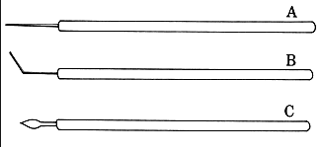Izvrstan diskronološki poremećaj.
thesoullessparty.bandcamp.com/album/tales-from-the-black-meadow
.
Listen to Tales From The Black Meadow and be introduced to the strange and wonderful world of Hammer Horror, of British Folklore, of Radiophonic Scores and things that go bump in the night. A delirious and delicious mystery…
In 1972, Prof. R. Mullins of the University of York went missing on a site in the North Yorkshire Moors, known as the Black Meadow. He left behind an extensive body of notes and research on the folklore of this mysterious place.
Mullins, a classics professor, had a great interest in Black Meadow, in particular its folklore and spent many years documenting its history and
tales that were part of the local oral tradition. In his office, his colleagues found over twenty thick notebooks crammed with stories and
interviews from the villages around Black Meadow.
Some of these stories seemed to be from the legendary disappearing village itself and tales that were part of the local oral tradition. In his office, his colleagues found over twenty thick notebooks crammed with stories and
interviews from the villages around Black Meadow.
provided some vital clues as to how the phenomena was interpreted and explained by the
local populace.
In 1978, Radio 4 produced a now rare documentary about the folklore,mystery and tales surrounding the Black Meadow area. It also featured music specially commissioned to accompany the programme. This music has recently been unearthed by the Mullins Estate and carefully isolated for your listening pleasure.
These stories, poems and songs have also been gathered together to capture the unsettling nature of the Black Meadow. Do not listen to this on your own at night and make sure you shut your windows. Listen for the stamping feet of the horsemen, avoid the gaze of the Watcher in the village and do not walk into the mist.
†
With Tales From The Black Meadow, its impossible to tell where fact ends and folklore begins. The Soulless Party is a collaboration between Reading author/musician Chris Lambert and Kev Oyston, a composer from Yorkshire. Tales From The Black Meadow is presented as the incidental music for a BBC Radio Documentary from 1978, discussing the legend of the Black Meadow and the disappearances that surround it. It is uncertain if there even IS a Black Meadow, and google’s not coughing up any results.
It seems as if the music that comprises the 10 tracks that the version available to listen to on bandcamp is most likely contemporary, but swathed in authentic, retroactive grit (including satisfying vinyl crackle and period-specific instrumentation). It could be the soundtrack for an old episode of Hammer House Of Horror . Clarinets, harpsichords, fiddles, all add up to give this a charming Victorian air, like they just don’t make anymore.
Barbarians have been heralding the death of hauntology for quite some time, and The Soulless Party are doing their best to prove that’s just not possible. The genie’s not going back in the bottle. We exist in a unique, post-modern liminal state, surrounded by recordings every waking moment. What’s a recording, if not a specter? There will always be people who have love for the dated, have been inspired by the past and are doomed to repeat it, if only to prove that they can. The British sect of hauntologists have always been exceptionally keen at creating false histories. A loving attention to detail and a doctoral knowledge of obscure ephemera are the marks of the Modern Antiquarian, and people like The Soulless Party, Pye Corner Audio, Demdike Stare, and Ghost Box are like modern Lovecraftian anti-heroes, the experts with the books that you consult, once the curse is unearthed.
This strikes at the heart of one of our central tenets, why we call it ancient modernism. We are interested in the past, and we are interested in the future. To hang on too tightly to the past results in a deadly nostalgia, will make you a curmudgeon before yr time, and willfully overlooks the plethora of advantages available to the modern scholar. However, to succumb to modernism is to be swept away with the tide. It will gradually erode what it is to be Human.
Imagine, if you will: some youngster hears a new 2 chainz jam they’re slobbering over, decides to become a hip-hop producer. He googles ‘trap music samples’, finds someone’s Angelfire page with some free samples, begging for praise and attention, drops some pitched snares onto his iPhone, and proceeds to utter the same inane gibberish for 32 measures, with some string samples from Nightmare On Elm Street 1. There you go, instant trap classic! Now, there is nothing wrong with this, i do it daily, but it is clearly not the heights of Human Potential. We build the Great Pyramids. We built Notre Dame. We are not doomed to chopped-n-screwed Britney Spears remakes for the rest of eternity.
 So what is called for, what is necessary, is some coming to grips with the traditional sense of the classic, the masterpiece. Genius exists, and to write it off, because you COULD be a genius so you don’t need to be, is utter bullshit. So there’s a whole class of artists, musicians, engineers and producers that are becoming expert on the Antiquated, that know every detail, every nuance, have objectively studied the strengths and weaknesses of the past, and are learning to wield it like a scalpel, or a katana.
So what is called for, what is necessary, is some coming to grips with the traditional sense of the classic, the masterpiece. Genius exists, and to write it off, because you COULD be a genius so you don’t need to be, is utter bullshit. So there’s a whole class of artists, musicians, engineers and producers that are becoming expert on the Antiquated, that know every detail, every nuance, have objectively studied the strengths and weaknesses of the past, and are learning to wield it like a scalpel, or a katana.
Of course, this raises the obvious eternal question: is it all hype or marketing gimmick, or is it in fact GOOD MUSIC? This author votes for the latter. Traditional concepts like a memorable melody (main theme), musicianship (either those are real instruments, played by real people, or some of the deftest programming and sampling we’ve heard all year), pacing and emotion are all accounted for. It reminds me of listening to Grieg, or Elgar‘s The Dream Of Gerontius.
Tales From The Black Meadow exudes an Elizabethan air, even if it is only a mock-up on a sound stage. It has the weight of mist and the presence of standing stones. This is weird Britannia.
The album comes in various formats: the 10-track version that can be streamed on BandCamp, and a 20-track CD edition, which includes a second disc that has the famed 1978 BBC Radio Documentary, that i am dying to hear and have not as i am dead fucking broke, so somebody should buy me a copy of the album, and i’ll write about that, too (seriously. e mail at j.forestpunk@gmail.com for my address). In addition, Chris Lambert has written a book to go along with the music, inspired by K. Oyston’s music. They have recently started The Brightwater Archive, with ephemera about the vanishing town, and all the missing people. Everything is immaculately antiquated, fonts and newspaper clippings specific to the era, a daring and daunting hoax, or a fantastical fact. I can’t tell what’s what anymore, and neither will you be able to, once The Soulless Party have had their way with you. - forestpunk.wordpress.com/An irresistibly evocative title that no budding hauntologist could rightly ignore. This was what first drew my attention to this new release from the Soulless Party (previously responsible for this rather good E.P of science fiction library music) - sleeve notes from Warren Ellis and a quick perusal of the promotional clip below sealed the deal.
Such is the attention to detail, that without any research on my behalf (there's been none) it's hard to separate the history from the cobblers (presumably mostly the latter) in the intriguing backstory of Black Meadow.
A mysterious area of the North Yorkshire Moors, a disappearing village, and the hapless Professor R. Mullins feature prominently, and "Tales from the Black Meadow" captures the spirit of this in a thoroughly successful manner - almost enough to convince of it's claim to being the incidental music created for a 1978 BBC radio documentary on the area.
An omnipresent vinyl crackle certainly assists in the suggestion that this music's ideal medium would be wax cylinder, but it's the somber and often mournful tunes themselves that have imprinted themselves firmly into the darker recesses of my psyche.
The main theme (and opening track) is the most memorable of these. Combining eerie organ work that sounds like the work of a certain Dr. Anton Phibes, with a beautifully stark melody which evokes the best work of Hammer Studios much underappreciated James Bernard, this is a tremendous mood setter that sets a tone that doesn't let up for a moment.
While the following pieces are often of a more incidental nature, they're no less riveting for it with swelling strings, the restless flapping of crow's wings and synthesized choral vocals which kept this particular listener in a state of blissful nostalgia with a nagging sense of trepidation lurking just below the surface.
Lovely stuff.
I've been checking out the ten track bandcamp version (downloadable here), but there's also a CD version with twenty tracks, which also includes a bonus disc featuring the 1978 radio documentary (also available through the bandcamp link).
My curiosity is certainly piqued. How about you? - Nathan Ford

Exploring Radio Space (2011)
http://thesoullessparty.bandcamp.com/album/exploring-radio-space


Nema komentara:
Objavi komentar